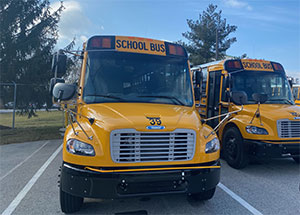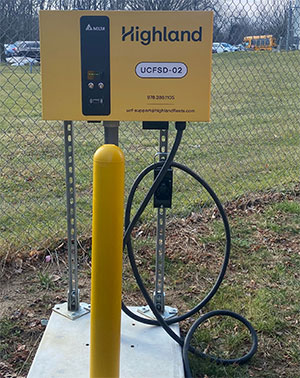Unionville-Chadds Ford Students have a New Ride to School
February 2024

In the Unionville-Chadds Ford School District, two electric school buses have entered the parking lot. The buses are part of a pilot to explore electrifying the bus fleet, a recommendation in the District's Sustainability Plan.
In November 2022 the School Board approved the acquisition of two electric school buses. The first bus was delivered in October 2023, and the second arrived in January 2024. The school district has contracted with Highland, an "electrification as a service" company specializing in electrifying student transportation, to support this movement. The District has a 12-year lease on the buses from Highland, which minimizes the District's risk since Highland is responsible for any maintenance and associated down-time of the buses. The cost of electricity for charging the buses is wrapped up into a simplified lease payment, which provides a consistent monthly cost for the District and reduces the budget impact of the high upfront cost of the buses (EV school buses are currently selling for about 3 times the price of a diesel bus — around $370,000. The battery alone accounts for about $100,000 of the cost.) At the end of the lease term the District has the opportunity to purchase the buses.

The electric school bus operates like any other bus, besides being powered by a battery. The ride is smooth, quiet, and notably odor-free. The bus can travel approximately 120 miles on one battery charge, though district representatives noted that each bus run uses only about 20% of a full charge. Both buses can simultaneously charge after each route at the two-port DC fast charger in the District's bus depot that was installed by Highland.
Not only do electric school buses decrease tailpipe emissions, noise pollution, health risks, but they can also provide a new source of power. The massive battery in these vehicles can be used for emergency back-up power, or to reduce power needs during peak usage times, which can lower electricity costs. While these "vehicle to grid" systems are still very new, there is significant possibility, especially when a bus fleet contains multiple EV buses.
There are several grant opportunities for offsetting the cost of electric school buses. These include:
- EPA Clean School Bus grant and rebate programs (next grant round expected to open in late spring/summer 2024)
- Driving PA Forward On-Road Rebate Program (the final round of this program is open now with approx. $2.2 million left in funding)
- Districts may be eligible for up to $40,000 per vehicle from the Commercial Clean Vehicle Tax Credit, which is available for direct-pay for tax exempt entities.

